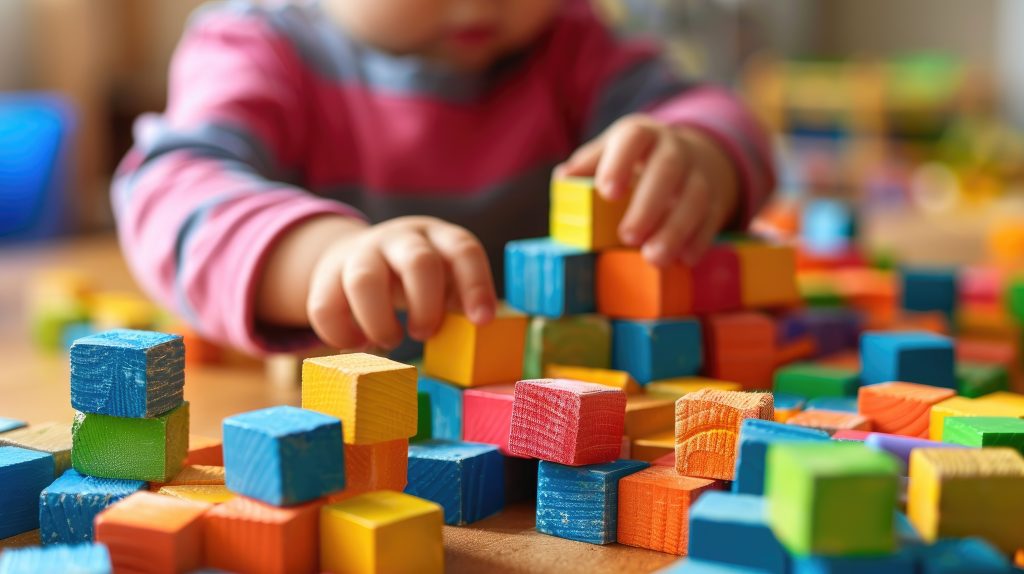
Play is the language of early childhood. It is through play that children learn to navigate the world, form relationships, and develop essential social and emotional skills. While play might seem like simple fun, it is a fundamental part of early childhood development that prepares children for the complex social and emotional challenges they will face throughout their lives. In daycares, preschools, kindergartens, and Montessori schools, playtime—both structured and unstructured—is an opportunity for children to grow, explore, and practice important skills like cooperation, empathy, and self-regulation.
In this blog, we’ll explore the role of play in developing social and emotional skills and examine how both structured and unstructured playtime contribute to a child’s growth. We’ll also highlight how daycare management software like WizHippo can help educators track and foster this development.
Why Play is Essential for Social and Emotional Development
Social and emotional development refers to a child’s ability to understand and manage emotions, build relationships, and interact positively with others. These skills form the foundation of a child’s ability to navigate social environments and cope with challenges later in life. Play provides a natural, engaging context for children to develop these skills while having fun.
Here’s why play is so critical to social and emotional development:
- Learning Through Interaction: Play allows children to interact with their peers, teachers, and even themselves, learning important social cues and emotional responses.
- Safe Space for Experimentation: During play, children feel safe to try out new behaviors, roles, and emotions without fear of failure. This experimentation is key to developing confidence and resilience.
- Building Emotional Awareness: Through play, children explore different emotions—both their own and those of others. This helps them develop empathy and emotional regulation.
Both structured and unstructured play offer unique benefits in helping children develop these essential social and emotional skills.
Structured vs. Unstructured Play: What’s the Difference?
Before diving into the benefits of play, it’s important to understand the difference between structured and unstructured play:
- Structured Play: Structured play is guided by an adult, usually with a specific goal or set of rules. This might include organized games, group activities, or teacher-led exercises. Structured play helps children develop skills like following instructions, cooperating in groups, and achieving specific goals.
- Unstructured Play: Unstructured play, also known as free play, is driven by the child’s imagination and interests. There are no predefined rules, and the child has full freedom to explore, invent, and decide how the play unfolds. Unstructured play encourages creativity, independence, and self-directed learning.
Both types of play are important for well-rounded social and emotional development.
The Role of Structured Play in Social and Emotional Development
Structured play offers a range of opportunities for children to develop specific social and emotional skills within a more controlled, goal-oriented environment. Here are some of the key benefits of structured play:
1. Learning Cooperation and Teamwork
Many structured play activities involve group participation, requiring children to work together to achieve a common goal. Whether they’re playing a team sport, building something together, or participating in a group art project, children learn how to cooperate, share, and take turns.
- Following Rules: Structured play teaches children to follow rules and understand the importance of boundaries. Learning to respect rules in a group setting fosters discipline and self-regulation.
- Resolving Conflicts: Group play can sometimes lead to disagreements, offering valuable lessons in conflict resolution. With the guidance of a teacher, children learn how to communicate effectively, negotiate, and find compromises.
WizHippo’s tools allow teachers to document how children participate in group activities, track their progress in social skills like cooperation, and share these insights with parents.
2. Developing Empathy and Emotional Awareness
Structured activities often involve role-playing games where children can explore different emotions, perspectives, and social roles. For example, in a role-play where children act out being a doctor or teacher, they learn to see things from another person’s point of view, developing empathy and emotional intelligence.
- Recognizing Emotions: Guided activities provide opportunities for teachers to help children recognize and name their emotions. For example, during a story-telling activity, a teacher might ask, “How do you think this character feels?” encouraging children to think about emotions in context.
- Managing Emotions: Structured play also helps children learn to manage their emotions within a group. For example, if a child is frustrated during a game, a teacher can guide them through calming strategies, teaching emotional regulation.
Through WizHippo, educators can record observations about how children handle emotional challenges during structured play and share this progress with parents, ensuring a team approach to the child’s development.
3. Building Confidence in Social Situations
Structured play provides opportunities for children to practice social interactions in a controlled environment. Whether they’re learning to introduce themselves to new friends or work with others to achieve a common goal, these experiences help children build confidence in their social skills.
- Setting and Achieving Goals: Activities like completing a puzzle or participating in a team relay race give children a sense of accomplishment. Achieving goals in a structured play setting boosts self-esteem and teaches children the value of persistence.
- Taking on Leadership Roles: Structured play often includes opportunities for children to take on leadership roles, helping them develop confidence in guiding others and making decisions.
The Role of Unstructured Play in Social and Emotional Development
While structured play provides guided opportunities for social and emotional growth, unstructured play allows children the freedom to explore and express themselves on their own terms. Here are the key benefits of unstructured play:
1. Fostering Creativity and Independence
Unstructured play encourages children to use their imagination, solve problems independently, and create their own rules. This type of play nurtures creativity and helps children develop a strong sense of autonomy.
- Imaginative Play: Whether it’s building a castle out of blocks or pretending to be an astronaut, unstructured play allows children to tap into their creativity. These imaginative scenarios help children explore different roles, emotions, and possibilities.
- Self-Direction: Free play puts children in control, allowing them to make decisions and solve problems on their own. This independence fosters self-confidence and helps children learn to trust their instincts.
WizHippo can be used to track how children engage in unstructured play, documenting their creativity, problem-solving abilities, and independent decision-making.
2. Exploring Emotions in a Safe Space
Unstructured play offers children a safe space to explore and express their emotions. Without the constraints of rules or expectations, children can act out different scenarios, try on new roles, and work through their feelings in a way that feels natural to them.
- Emotional Expression: Free play gives children the freedom to express a wide range of emotions. For example, a child may use playtime to work through feelings of frustration by pretending to be a superhero, or they may create a scenario where they are the caregiver, helping them process emotions like empathy or nurturing.
- Learning Emotional Regulation: As children navigate play on their own, they learn how to manage their emotions without external guidance. For example, if they become frustrated with a challenging task during play, they have the opportunity to practice calming themselves and finding a solution.
Through WizHippo’s behavioral tracking features, educators can monitor emotional regulation during playtime and use these insights to support children in developing healthy coping strategies.
3. Developing Social Skills Through Peer Interaction
Unstructured play is a natural setting for children to practice social skills with their peers. Without adult-imposed rules or guidance, children must negotiate, share, and collaborate with others to achieve their play goals.
- Negotiation and Cooperation: Free play often involves negotiation, as children must decide together what roles they will take on, how they will play, and what the “rules” of their game will be. These experiences help children learn how to communicate effectively and work together.
- Conflict Resolution: Without an adult directing the activity, children have to navigate conflicts on their own during unstructured play. Whether it’s sharing toys or deciding whose turn it is, children learn valuable lessons in conflict resolution.
WizHippo enables educators to log and track social interactions during unstructured play, allowing teachers to identify patterns in behavior and intervene when necessary to support positive social development.
How WizHippo Supports Social and Emotional Development Through Play
WizHippo is a comprehensive daycare management software designed to support educators in tracking and fostering children’s social and emotional development. Here’s how WizHippo can help:
- Behavioral and Social Tracking: WizHippo allows teachers to track children’s social interactions, emotional responses, and behavior during both structured and unstructured play. These observations can be recorded, analyzed, and shared with parents to provide a clear picture of each child’s development.
- Progress Reports: Educators can generate detailed progress reports that highlight a child’s growth in social and emotional skills. These reports can be customized to include observations from both structured and unstructured play, offering a holistic view of the child’s development.
- Parent Communication: WizHippo’s communication tools make it easy for teachers to share updates, photos, and observations with parents. This transparency ensures that parents are involved in their child’s development and can reinforce social and emotional learning at home.
- Customizable Goals: Teachers can set and track specific social and emotional goals for each child, such as improving cooperation during group activities or practicing emotional regulation. WizHippo makes it easy to monitor progress toward these goals and adjust teaching strategies as needed.
Conclusion
Play is much more than just fun for early learners—it is a critical tool for developing social and emotional skills that will serve children throughout their lives. Both structured and unstructured play offer unique opportunities for growth, from learning how to cooperate with others to expressing emotions in a safe, imaginative environment.
With WizHippo, educators can track and support social and emotional development through play, providing actionable insights that help teachers and parents work together to support each child’s growth. Want to learn more about how WizHippo can enhance your daycare or preschool’s approach to play-based learning? Visit WizHippo today to discover how our platform can help you create a nurturing, supportive environment for every child.

Stay Updated with the Latest in Daycare Management!
Subscribe to our newsletter to receive expert tips, industry news, and special offers straight to your inbox. Plus, get exclusive access to free resources and guides to help you streamline your childcare operations.
